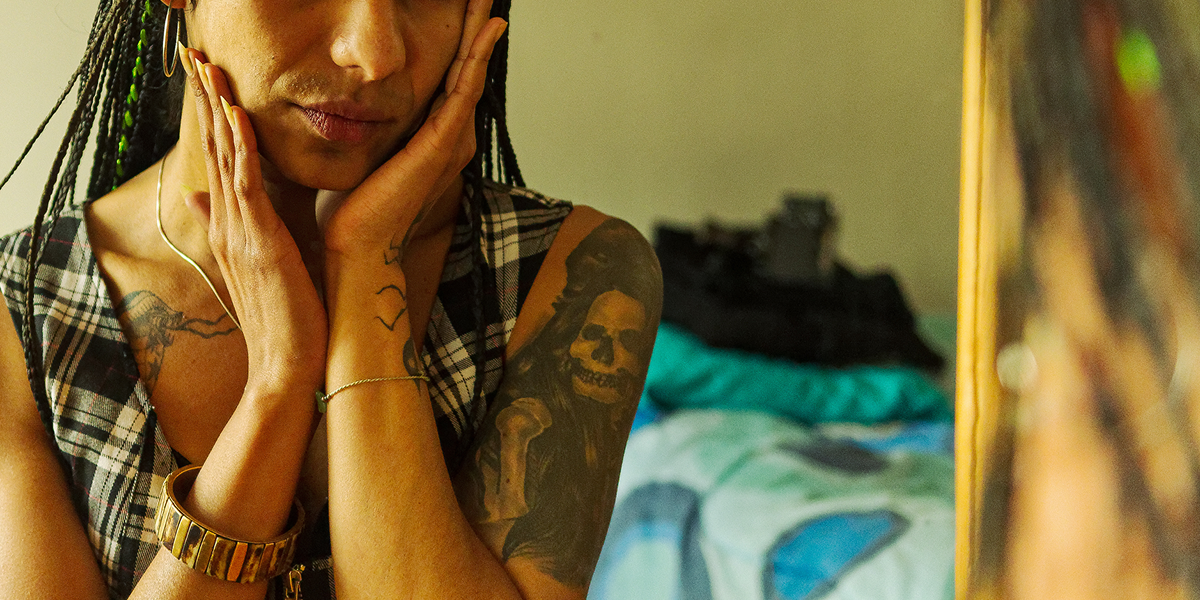It’s National Eating Disorders Awareness Week. Every year during this seven day period, major media outlets suddenly show interest in eating disorders. While spreading awareness is certainly important, the information that’s shared is often reduced to lists of statistics, sob stories, and over-simplified recovery narratives — and the experiences of straight, cis people are almost always at the forefront.
If you’re an A+ subscriber, then you probably know I recovered from an eating disorder — I bring it up all the time when I’m answering A+ advice questions, because it’s had such an enormous impact on how I see the world. After nearly two and a half years at Autostraddle, this is my first time writing about eating disorders on our main site — because despite all of the work I’ve done to recover from my eating disorder, to forgive myself for engaging in unhealthy behaviors, and to acknowledge the many people and systems that played a role in the development and maintenance of my eating disorder, I felt shame about it for a long time. I lived with anorexia from my early teens through my early twenties, but I didn’t consider myself fully recovered until I hit my mid-twenties. The beliefs and behaviors I engaged in during those years went against everything I’ve ever believed in. Acknowledging my anorexic past used to feel embarrassing, like admitting I voted Republican in my elementary school’s mock election (long story), only this was a years-long ordeal that persisted despite my radical queer politics.
This year, I’m choosing to get over myself and create the queer #NEDAwareness media coverage I want to see. Here’s what I wish people knew about eating disorders.
Eating disorders affect people across all demographics.
I waited years to seek help for my eating disorder because I didn’t think I could possible have one. I’m a masc dyke, and I didn’t see myself represented in the popular narrative of eating disorders, which privileges the experiences of young, thin, straight, white, cis women. Because of this narrative, LGBTQ+ people, fat folks, people of color, disabled people, older folks, and men often have a hard time recognizing disordered behaviors.
Eating disorders are incredibly common in the LGBTQ+ community.
Multiple studies have shown that LGBTQ+ adults and adolescents experience greater incidence of eating disorders than straight, cis folks. One study by the National Eating Disorders Association (NEDA) and the Trevor Project found that more than half of the LBGTQ+ youth surveyed had been diagnosed with an eating disorder, a fact I desperately wish I’d known as a young person. According to the NEDA, some factors that might play a role in the development of an eating disorder include internalized homophobia or transphobia, gender dysphoria, experiences of homophobic or transphobic violence, and the “inability to meet body image ideals within some LGBTQ+ cultural contexts.” That last one hits home for me. I remember watching The L Word for the first time (secretly — illegally downloaded on the “family computer” — as a teen growing up in Indiana). I was already primed to develop an eating disorder thanks to the many anti-fat/ pro-diet culture messages that came from my family, my peers, and late 90s/early 2000s media (yikes), and when I watched Shane dive naked into the pool, I thought, “If I want girls to date me, I have to look like THAT?!” Androgyny is often unfairly associated with thinness (and with whiteness), and for queer and trans people who strive for an androgynous gender expression, that can be an unhealthy, impossible standard.
You can be any weight or body size and have an eating disorder.
You can be a fat person with a restrictive eating disorder. You can be a thin person with binge eating disorder. You can develop an eating disorder and stay the same size you were before. Eating disorders are thoughts and behaviors — that’s it — and those thoughts and behaviors can seriously harm your body and your mental health even if you “don’t look like” you’re struggling. When I initially reached a weight that was healthier for my body in my early twenties, I may have “looked” like I’d fully recovered from anorexia, but that wasn’t true at first — I was actually in a cycle of restricting and binging, and my eating disorder thoughts were just as loud as they’d been when I was only in restrict mode.
It’s also important to remember that eating disorders aren’t always rooted in negative body image. People develop patterns of unhealthy behavior around food for all kinds of reasons, and many of those reasons have nothing to do with bodies.
Many people living with eating disorders have trouble accessing treatment due to cost and medical bias.
When I decided to pursue therapy at an eating disorder recovery center, I was low-income, but I was able to buy health insurance through the marketplace thanks to an insurance stipend from one of my many low-paying jobs that didn’t offer actual benefits. If I hadn’t had that stipend, I probably wouldn’t have been able to access the care I needed. Cost is an even more pressing issue for uninsured folks and for low-income and/or uninsured people who require more intensive care, such as inpatient or partial hospitalization treatment — but money isn’t the only barrier to treatment. Many marginalized people have a hard time getting diagnosed with eating disorders because doctors don’t take their symptoms seriously. This is especially true for fat folks and for people of color. One particularly chilling study found that when presented with identical case studies demonstrating disordered eating symptoms in women of different races, 44% of clinicians identified the white woman’s behavior as problematic and only 17% identified the Black woman’s behavior as problematic.
Our culture celebrates some eating disorder behaviors, and that makes it hard to get help.
Here’s another reason why it took me so long to recognize that I had a problem: My eating disorder behaviors (restricting my overall food intake, eliminating certain foods and food groups, overexercising, etc.) were consistently affirmed by my family, my friends, and even my doctors. I was praised for being “healthy” when I felt horrible all the time. On top of the mental stress and anxiety that my eating disorder caused, I was sick and exhausted, I had injuries from overexercising, and when my peers hit puberty, I didn’t get my period.
I actually saw multiple doctors about my lack of a menstrual cycle throughout my teens and early twenties, and they performed countless tests, including: multiple pelvic exams by a male doctor when I was a young, queer teen who was not yet sexually active; multiple blood tests; an ultrasound; a transvaginal ultrasound; and a brain MRI. No doctor could explain why my estrogen was so low because I “looked so healthy.” Folks, I just needed more nutrients and body fat! Once I eased up on my food restriction in my early twenties, I got my period and have maintained a regular cycle ever since.
When I was about sixteen, I collapsed and was taken to the ER. The doctors there found that my potassium was dangerously low and they had no idea why, so they performed a spinal tap. Again, I just needed more food! I did not need a spinal tap! If any of my doctors had asked me about my food intake or exercise between the ages of 15 and 23, maybe I would have gotten help sooner. Instead, I had to undergo a series unnecessary and invasive medical tests, and their insistence that I was “so healthy” led me to further justify my inarguably unhealthy behaviors.
It’s worth noting that while doctors were eager to test me, a dangerously thin person, for medical conditions I didn’t have, doctors were refusing to test or treat my fat friends when they had non-weight-related health concerns, encouraging them to instead “lose weight and come back” in a few months. While the assumption that “thin = healthy” certainly delayed my recovery, the harm done to fat folks by anti-fat medical bias is far more severe and can lead to long-term, untreated health complications and even death.
Eating disorders are not glamorous.
While the media has historically glamorized eating disorders, they’re incredibly dangerous — anorexia in particular has the highest mortality rates of any mental illness. Eating disorders can also lead to health complications that can last far beyond recovery, including tooth decay, organ damage, chronic digestive irregularity, acid reflux, osteoporosis, hormonal imbalance, infertility, neuropathy, changes in brain structure, decreased cognitive functioning, and more. Here are just a few of the un-glamorous things that happened to me when I was actively engaging in eating disorder behaviors: my vagina dried up due to low estrogen; I passed out in a Trader Joe’s and refused to drink the orange juice an employee offered me because I was afraid of sugar; I ate my roommate’s food after a bout of restriction and lied about it; I binged on dried apricots after another bout of restriction and proceeded to shit my pants while riding a bike; I skipped multiple important social events to exercise or to avoid the food that would be served there; I threw food in the trash and later ate that food out of the trash; I could go on. In short, I learned this the hard way: eating disorders don’t make you sexy — they make you shit your pants.
Recovery is possible (and it’s the best).
Just before I started recovering from anorexia, I was seeing a therapist to help manage my anxiety. When I eventually found the courage to bring up my “eating issues,” that therapist told me she did not believe in eating disorder recovery. According to her, I could strive to “manage” my behaviors, but I would never “get better.” This framework might be helpful for some people in recovery, but I knew that it wouldn’t help me. I left her office in the middle of that session and never went back.
After that horrible visit, I sought out every resource I could find about eating disorder recovery and body image. I read articles and listened to podcasts by Health At Every Size (HAES) therapists and “anti-diet” dietitians. I read articles by other masc queer folks (including one on this very website) who were also in recovery. I started attending a weekly LGBTQ+ eating disorder support group. Then I found a queer-informed therapist who specialized in eating disorder recovery, and the work I did with her was the most important and transformative work of my life.
Recovering from anorexia means I have so much more space in my life for things that are actually important. My friendships have been deeper. My relationships have been stronger. And while the recovery process was hard, I will always be proud of myself for building the life I have today. I’m proud every single time I order whatever sounds good at a restaurant instead of ordering the smallest, “safest” meal. I’m proud every single time I exercise simply for the joy of moving, and I’m proud every single time I choose to rest.
My recovery is so strong that I went through multiple breakups and stayed recovered. I lived through two years of a global pandemic and stayed recovered. I got diagnosed with a chronic illness and stayed recovered. And I’ve maintained the confidence to interrupt every time diet culture comes up in conversation (and no, I won’t shut up about it).
If you’re currently living with an eating disorder or if you’re just starting the recovery process, please remember that you’re not alone. If you don’t know where to start in recovery or your struggling to find professional help, NEDA offers a helpline, screening tools, a provider database, and a list of resources for free and low-cost support; and FEDUP offers recovery resources that are specifically geared towards trans, gender non-conforming, and intersex folks.







